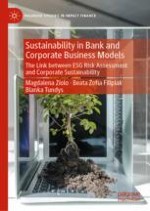2021 | OriginalPaper | Buchkapitel
6. Sustainable Business Models of Companies
verfasst von : Blanka Tundys
Erschienen in: Sustainability in Bank and Corporate Business Models
Aktivieren Sie unsere intelligente Suche, um passende Fachinhalte oder Patente zu finden.
Wählen Sie Textabschnitte aus um mit Künstlicher Intelligenz passenden Patente zu finden. powered by
Markieren Sie Textabschnitte, um KI-gestützt weitere passende Inhalte zu finden. powered by
